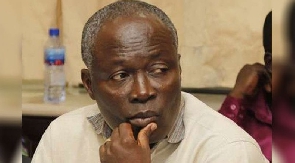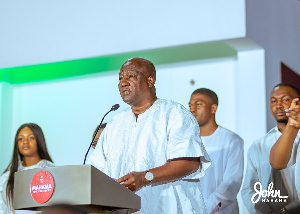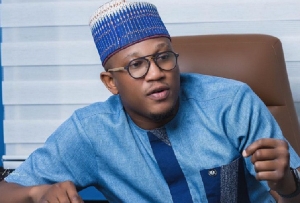President Nana Akufo-Addo has said Ghana intends monetising its gas resources from the Jubilee, TEN, and Sankofa oil fields.
“Our oil and gas deposits in the Jubilee, TEN and Sankofa fields offer us the perfect opportunity to create petrochemical industries, including monetising our gas to create a multi-billion dollar gas feedstock industry,” Nana Akufo-Addo said at the New Year Greetings with the Diplomatic Corps on Wednesday, 15 February.
“We have the opportunity to link together our numerous natural resources, like food produce, bauxite, iron ore, oil and gas, with our talents, energy and sense of enterprise to turn our nation into an economic powerhouse in Africa, generating employment and income for our youth,” the president said.
Below is the president’s full speech:
I am honoured to have all of you present at this evening’s event and happy to see you. Some faces are familiar, as I had the privilege of meeting them during my time as leader of Ghana’s opposition, and a few others also, from the now distant days of my period as Foreign Minister. Others I am seeing for the very first time. Nonetheless, I am happy to see you here at the seat of the presidency and I know that, over the course of my tenure of office, we will have the opportunity to meet regularly and interact
I am particularly touched that I have become Ghana’s President in this sixtieth year of our independence, a symbolic year, and I hope that the remembrance of the sacrifices and efforts of our founding fathers, those who gave their lives to achieve our independence, will guide and motivate me in the discharge of this high office. I pray for God’s support.
At the onset, let me thank Ambassador Mrs. Pavelyn Tendai Musaka of the Republic of Zimbabwe for her leadership these past years as the Dean of the Diplomatic Corps. Your Excellency, everyone I have spoken to pays glowing tribute to you, and I can only encourage you to keep it up.
As you are all aware, I am in the process of forming my government. I have been in office for some 5 weeks, and so far so good. Parliament has approved all 36 of my ministerial nominees; the 10 Regional Ministers are currently being vetted; and shortly I will announce my nominees for the positions of deputy Ministers. The various Metropolitan, Municipal, and District Chief Executives will soon be announced, and, already, a number of heads of state institutions and agencies have been appointed, albeit in acting capacities, pending the constitution of the Council of State.
Yesterday, I announced the names of 11 eminent Ghanaians who I have appointed to the Council of State, and I have sent to Parliament for its approval the names of two distinguished former leaders of our security services for appointment to the Council of State, as required by the Constitution. The election of regional representatives to the Council, which will complete its composition, will take place tomorrow. I expect that, by the middle of next month, God-willing, the full complement of the Akufo-Addo administration will be in place, so we can mobilise all our forces to deliver on the mandate entrusted so emphatically on our shoulders by the Ghanaian people on December 7, 2016.
Ghana, today, is facing a promising future. We have enjoyed the longest period of stability since independence. We are, arguably, the most stable, fluorishing democracy in our region and continent, who showed, on the 7th of December last, dignity and serenity in the exercise of our sovereign franchise. We have a large pool of educated Ghanaians, both in Ghana and in the Ghanaian Diaspora, and a hardworking population from which we can draw to drive our economic development. We have seen sustained economic growth over the last two decades. Despite the decline of the last few years, we continue to be one of the leading producers of gold and cocoa in the world, and on top of all that, we are now an oil producing economy. Sadly, however, the structure of our economy has not changed substantially since the era of Governor Gordon Guggisberg – an exporter of raw materials with little or no value-addition activities. This is why I have called our economy the Guggisberg economy.
My government’s commitment, which I have attempted to articulate over the years, will be to inspire the transformation of the structure of the Ghanaian economy. My government’s economic vision will focus on executing an integrated industrialisation programme, with a clear bias towards supporting our small and medium scale enterprises with access to science and technology, incentives and markets to make them more productive and competitive. We plan on introducing programmes that will boost productivity of the agricultural sector and introduce incentives that will encourage our banks to provide affordable credit and other financial services to SMEs and launch a new wave of viable industries across Ghana. This is summed up in our slogans “1-District-1-Factory” and “1-Village-1-Dam”.
Our oil and gas deposits in the Jubilee, TEN and Sankofa fields offer us the perfect opportunity to create petrochemical industries, including monetising our gas to create a multi-billion dollar gas feedstock industry. We have the opportunity to link together our numerous natural resources, like food produce, bauxite, iron ore, oil and gas, with our talents, energy and sense of enterprise to turn our nation into an economic powerhouse in Africa, generating employment and income for our youth.
My government is not going to shy away from making the critical choices that are necessary for the long-term interest of our people. We are going to invest heavily in building up the most important ingredient of development: the intellectual property of the people – the mind – education, education, education – our sure key to success. We want to add value to our human capital, add value to our governance, add value to our public services, add value to our infrastructure and add value to our economy. We will govern honestly. We are determined to get Ghana once again to lead our continent on two fronts: in entrenching democracy and the rule of law, and in transforming the structure of the African economy to a modern, manufacturing kind that has the capacity to generate jobs for our people, and create and spread wealth across the length and breadth of our vast continent.
It was not for nothing that Ghana was the first black African country to break free from colonial rule. We are determined to show that we can emulate the successes of the Asian nations, and, thereby, create a modern, prosperous nation. We believe that a world dominated by a handful of rich nations, with the majority of nations in the south languishing in poverty and misery, is not a prescription for global security. Our generation is not seeking hand-outs from anybody, and neither are we going to be pawns or victims. And to paraphrase Edmund Burke, the famous British statesman, it is in the interest of global equilibrium that wealth should be found everywhere.
Our common humanity requires that we forge partnerships with the developed world that would lead to the transformation of the lives of the Ghanaian and African peoples, a transformation that would bring the mass of our people out of poverty into a marked enhancement of the quality of their lives. To this end, perhaps now more than ever, I wish to assure you that all the alliances and friendships that we have entered into over the last 60 years are going to be developed and maintained during my time as President of the Republic. We are determined to leverage these alliances and friendships to grow our economy and nation.
Ghana’s engagement with other African countries will be the prime focus of its foreign policy. Ghana will be very active members of ECOWAS and the AU. It is in this spirit that we deployed some 208 troops as part of ECOWAS’ mission to the Gambia. This mission created an enabling environment for the effective enforcement of the rule of law in the Gambia, and, thus, made it possible for a peaceful resolution of the electoral impasse. The decisive election of our compatriot, Thomas Kwesi Quartey, a professional diplomat, who acted as Secretary to my predecessor, President John Dramani Mahama, as Deputy Chairperson of the African Union Commission, and the election of Kathleen Quartey Ayensu and Daniel Batidam onto two legal organs of the AU, at the just ended 28th Summit of the AU in Addis Ababa, points to Ghana’s determination to retake her pride of place amongst the comity of nations on the continent. We support fully the important decisions taken at this year’s AU Summit. Proposals for institutional reforms of the AU were considered and accepted. The Summit agreed on new, sustainable ways of financing the AU so the body can be self-sufficient and preserve its self-respect by weaning itself off dependence on the charity of others. The Assembly of Heads of State also signed up to the Continental Free Trade Agreement, whose purpose is to ensure significant growth of intra-Africa trade, as well as to assist countries on the continent to use trade more effectively for growth and sustainable development.
The growth of democracy in our country and continent is threatened by the spread of terrorism. Ghana stands firmly with all civilised nations in repudiating terrorism as an instrument of political action and commits itself to doing everything within its means to support regional, continental and global efforts to defeat this 21st century scourge.
Ghana is equally committed to the reforms of the global political order. The inability of the United Nations to undertake the reforms of its institutions that will reflect the realities of our times, and not the realities of the post-war world, represents a manifest injustice against the peoples of Africa. We, on this continent, are an integral part of the global order, and global institutions should reflect this fact. For a handful of states who emerged as the dominant powers in the world after the Second World War of the 20th century to continue, in the 21st century, to be the sole arbiters of international security remains, to us, a structural deficit, which the world community should no longer tolerate. I had the privilege as Foreign Minister of chairing the colloquium of Foreign Ministers that fashioned the Ezulwini Consensus -–Africa’s common position on UN reforms. I continue to subscribe to the goals of that consensus, and would use this occasion to call for the reform of the Security Council to reflect the realities of our time.
Our commitment to the values of democracy, respect for human rights and the rule of law will continue to shape our foreign policy. I would, therefore, like to renew my commitment to Ghana’s continued collaboration with your respective countries and international organisations in this symbolic year and in the many years ahead, in order to advance further our common pursuit of greater co-operation, and to deepen and strengthen our ties of friendship.
There is a new wind of optimism and revival blowing today across our country, which we are determined to harness to bring about the progress, prosperity and happiness of the Ghanaian people.
I wish you and your families well, and above all, success in your duties as accredited representatives of your countries and international organisations to Ghana.
Happy New Year, Afehyiapa, and may God bless us all.
Thank you.
Click to view details



General News of Thursday, 16 February 2017
Source: classfmonline.com

















